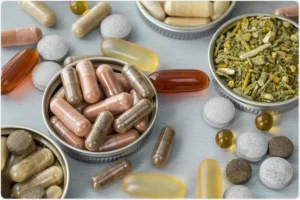Protect Your Cells: The Power of Antioxidant Supplements

Our body faces daily battles against harmful substances called free radicals. These free radicals can damage our cells, leading to aging, diseases, and weakened immunity. The good news is that antioxidants can help protect our cells and keep us healthy.
Antioxidant supplements have become popular because they offer an easy way to support our body’s defense system. In this blog, we’ll explore what antioxidants are, how they work, and why supplements might be important for maintaining overall health.

What Are Antioxidants?
Definition:
Antioxidants are compounds that fight free radicals in our body.They prevent or slow down cell damage caused by oxidative stress.
 Sources of Antioxidants
Sources of Antioxidants
- Natural Sources: Fruits, vegetables, nuts, seeds, and whole grains.
- Supplements: Capsules or powders containing concentrated antioxidant compounds.
Types of Antioxidants
- Vitamin C: Found in oranges, lemons, and bell peppers.
- Vitamin E: Present in almonds, sunflower seeds, and spinach.
- Beta-Carotene: Found in carrots, sweet potatoes, and pumpkins.
- Selenium: A mineral found in Brazil nuts and seafood.
What Are Free Radicals and Oxidative Stress?
Free Radicals:
Free radicals are unstable molecules produced when the body breaks down food or is exposed to environmental factors like pollution or UV rays.
These molecules can harm cells if not neutralized.
Oxidative Stress:
Oxidative stress occurs when there’s an imbalance between free radicals and antioxidants.
It can lead to cell damage, premature aging, and chronic diseases like heart disease, diabetes, and cancer.

Common Triggers of Oxidative Stress
- Smoking and alcohol consumption.
- Exposure to pollution and harmful chemicals.
- Poor diet and lack of physical activity.
- Prolonged stress.
How Do Antioxidants Protect Our Cells?
1. Neutralizing Free Radicals:
Antioxidants donate electrons to free radicals, stabilizing them and preventing cell damage.

2. Repairing Damaged Cells:
Some antioxidants help repair cells that have already been harmed by oxidative stress.
3. Supporting Immune Function:
Antioxidants boost the immune system, helping the body fight infections and inflammation.
Why Consider Antioxidant Supplements?
1. Limited Dietary Intake:
Not everyone consumes enough fruits and vegetables daily.
Supplements can fill the gap in your diet.
 2. Increased Exposure to Free Radicals:
2. Increased Exposure to Free Radicals:
Modern lifestyles expose us to more free radicals through pollution, processed foods, and stress.
3. Aging:
As we age, the body produces fewer antioxidants, increasing the need for external sources.
4. Specific Health Concerns:
Conditions like diabetes, arthritis, or cardiovascular diseases may require higher antioxidant levels.
Benefits of Antioxidant Supplements
1. Slowing Down Aging:
Antioxidants reduce oxidative stress, which is a major cause of skin aging.
They improve skin elasticity and reduce wrinkles.
2. Supporting Heart Health:
Antioxidants like Vitamin E help prevent cholesterol oxidation, reducing the risk of heart disease.
 3. Improving Eye Health:
3. Improving Eye Health:
Compounds like lutein and zeaxanthin protect the eyes from damage caused by UV light and aging.
4. Boosting Immunity:
Antioxidants strengthen the immune system, making it easier to fight infections.
5. Enhancing Recovery:
They reduce inflammation and muscle soreness after exercise, speeding up recovery.
Popular Antioxidant Supplements and Their Benefits
1. Vitamin C:
Supports collagen production for healthy skin and bones.
Strengthens the immune system.
2. Vitamin E:
Protects cell membranes from damage.
Helps improve skin health and reduce scars.
3. Selenium:
Supports thyroid function and prevents oxidative stress.
Helps reduce the risk of certain cancers.
 4. Coenzyme Q10 (CoQ10):
4. Coenzyme Q10 (CoQ10):
Improves energy production in cells.
Beneficial for heart health and reducing fatigue.
5. Polyphenols:
Found in green tea extract, these compounds reduce inflammation and support weight management.
6. Alpha-Lipoic Acid (ALA):
Acts as a powerful antioxidant in both water and fat environments.
Helps manage blood sugar levels.
How to Choose the Right Antioxidant Supplement
1. Consult a Doctor:
Always seek advice from a healthcare provider before starting supplements.
2. Look for Quality:
Choose supplements from reputable brands with clear labeling.
 3. Avoid Overdosing:
3. Avoid Overdosing:
Stick to the recommended daily intake to prevent side effects.
4. Consider Your Needs:
Pick antioxidants based on your specific health concerns, such as aging, immunity, or heart health.
Are There Any Risks with Antioxidant Supplements?
1. Overconsumption:
Taking too many antioxidants can lead to side effects like nausea, headaches, or even toxicity.
2. Interaction with Medications:
Some supplements may interfere with medications, such as blood thinners.
3. Not a Replacement for a Healthy Diet:
Supplements are meant to support, not replace, natural food sources of antioxidants.
 How to Boost Antioxidants Naturally
How to Boost Antioxidants Naturally
1. Eat a Balanced Diet:
Include a variety of colorful fruits and vegetables.
Add nuts, seeds, and whole grains to your meals.
2. Stay Active:
Regular exercise boosts the body’s natural antioxidant production.
 3. Avoid Smoking and Excessive Alcohol:
3. Avoid Smoking and Excessive Alcohol:
These habits increase free radicals in the body.
4. Manage Stress:
Practice relaxation techniques like yoga or meditation.
Final Thoughts:-
Antioxidants play a vital role in protecting our cells and supporting overall health. While natural food sources are ideal, antioxidant supplements can be a valuable addition, especially for those with dietary gaps or increased exposure to free radicals.
Remember, the key to reaping the benefits of antioxidants is balance. A healthy diet, combined with the right supplements, can keep your cells protected and help you lead a healthier life. Always consult a healthcare professional before starting any new supplement.
